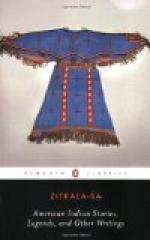Blue-Star Woman was left an orphan at a tender age. She did not remember them. They were long gone to the spirit-land,-and she could not understand why they should be recalled to earth on her account. It was another one of the old, old teachings of her race that the names of the dead should not be idly spoken. It had become a sacrilege to mention carelessly the name of any departed one, especially in matters of disputes over worldy possessions. The unfortunate circumstances of her early childhood, together with the lack of written records of a roving people, placed a formidable barrier between her and her heritage. The fact was events of far greater importance to the tribe than her reincarnation had passed unrecorded in books. The verbal reports of the old-time men and women of the tribe were varied,—some were actually contradictory. Blue-Star Woman was unable to find even a twig of her family tree.
She sharpened one end of a long stick and with it speared the fried bread when it was browned. Heedless of the hot bread’s “Tsing!” in a high treble as it was lifted from the fire, she added it to the six others which had preceded it. It had been many a moon since she had had a meal of fried bread, for she was too poor to buy at any one time all the necessary ingredients, particularly the fat in which to fry it. During the breadmaking, the smoke-blackened coffeepot boiled over. The aroma of freshly made coffee smote her nostrils and roused her from the tantalizing memories.
The day before, friendly spirits, the unseen ones, had guided her aimless footsteps to her Indian neighbor’s house. No sooner had she entered than she saw on the table some grocery bundles. “Iye-que, fortunate one!” she exclaimed as she took the straight-backed chair offered her. At once the Indian hostess untied the bundles and measured out a cupful of green coffee beans and a pound of lard. She gave them to Blue-Star Woman, saying, “I want to share my good fortune. Take these home with you.” Thus it was that Blue-Star Woman had come into unexpected possession of the materials which now contributed richly to her breakfast.
The generosity of her friend had often saved her from starvation. Generosity is said to be a fault of Indian people, but neither the Pilgrim Fathers nor Blue-Star Woman ever held it seriously against them. Blue-Star Woman was even grateful for this gift of food. She was fond of coffee,-that black drink brought hither by those daring voyagers of long ago. The coffee habit was one of the signs of her progress in the white man’s civilization, also had she emerged from the tepee into a log hut, another achievement. She had learned to read the primer and to write her name. Little Blue-Star attended school unhindered by a fond mother’s fears that a foreign teacher might not spare the rod with her darling.
Blue-Star Woman was her individual name. For untold ages the Indian race had not used family names. A new-born child was given a brand-new name. Blue-Star Woman was proud to write her name for which she would not be required to substitute another’s upon her marriage, as is the custom of civilized peoples.




